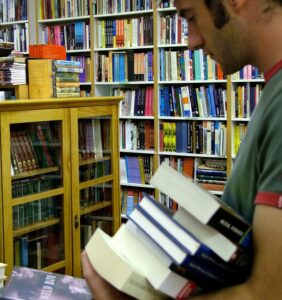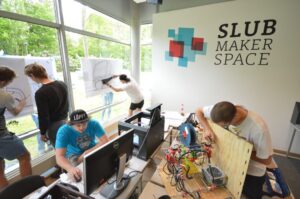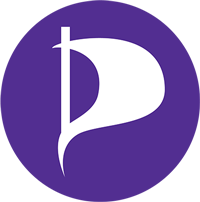Culture
Our culture is increasingly becoming digital. Our possibilities to create, share and develop art could be endless. In order to meet the needs of the new cultural landscape, we must level the playing field so that all actors have equally good conditions to participate in culture. We want art, culture and knowledge to be accessible to everyone. We want remixing to be an art practice that is not hindered by copyright. We want art and knowledge to be as obvious and as accessible as borrowing a book from the library.
Overview – The Pirate Party wants to:
- Copyright is being reformed to favor the creation and dissemination of culture
- The model of lending e-books at libraries is being reformed
- Tax-financed culture must be publicly available
- Municipalities must provide maker spaces in the form of shared workshops for all forms of creation
1. A reformed copyright

In order to favor the spread of culture and knowledge, which is the basis for all cultural creation, the Pirate Party wants to see a strong limitation of the commercial protection period in copyright to five years. In order for the protection period to continue to apply after five, ten and fifteen years, the rights holder must apply for this, and register in a publicly searchable database. After twenty years, the possibility to extend the commercial copyright ceases.
We want to reform copyright, but the non-profit right must still apply. No one should be able to claim that they created a work that someone else has created. This creates strong protection for artists and cultural creators, who can then be recognized for their creativity and artistry. The non-profit copyright must remain unchanged.
Free non-commercial file sharing
 With the arrival of the Internet on the world stage, people’s communication channels have changed tremendously. In particular, it has become easier to share culture between each other. In the past, physical copies were lent to each other –
With the arrival of the Internet on the world stage, people’s communication channels have changed tremendously. In particular, it has become easier to share culture between each other. In the past, physical copies were lent to each other –
today digital. However, the copyright industry equates this with theft and has therefore, with the help of strong lobbying, influenced politicians to legislate against file sharing. The problem with a ban on file sharing is that it is basically impossible to prove someone’s guilt/liability if you don’t also search people’s private communications. Something that is a violation of personal integrity. Free non-commercial file sharing should be allowed.
Remix and quote
By reforming copyright, innovation and creativity within the maker culture can be benefited. The myth of a lone genius creator is of course not true. One idea is inspired by another and generates a better solution to a problem. Copyright as it exists today can put a damper on the creative process. In the maker world, both knowledge and culture are generated, but right now it risks being inhibited. Remixing, parodies, quotations and sampling shall be exceptions to the exclusive right of commercial copyright.
Therefore, we want to:
§1 The commercial term of copyright protection is shortened to five years;
§2 The commercial protection term can be extended in five-year intervals up to a maximum of twenty years;
§3 Non-commercial file sharing is legalized;
§4 A general exception to copyright similar to the American “fair use” is introduced.
2. Tax-funded culture
It is unfortunate that much of the culture that is funded by tax dollars does not benefit citizens on a large enough scale. It is reasonable that such material is documented and published with free licenses. Digitization makes more culture available to those who, for various reasons, e.g. due to functional variation or distance, cannot take part in certain culture.
If e.g. cultural or sports events are paid for with public funds or receive public contributions, it must be permitted to record the event and make it public, so that everyone can take part in and refine the experience further. We want all tax-financed culture to be digitized and made available online as much as possible.
Therefore, we want to:
§5 Tax-financed culture is, to the extent possible, digitized and made freely available;
§6 Tax-funded culture should not be locked behind copyright.
3. The public libraries

Public libraries are undergoing change. Many people ask the question – why should you go to a library? All knowledge is available on the internet. But in a world of an abundance of information, we also seem to have forgotten how to be critical of sources. Internationally, libraries have taken up the fight against disinformation.
Locally, the public libraries are tasked with focusing especially on children and young people to stimulate reading and language development, assisting with materials for new Swedes and library users with functional variations. But perhaps most important of all is the public library’s function as a physical meeting place. Libraries are one of the few remaining physical meeting places that are free and free to visit. Libraries are places of study, oases of knowledge, cultural centers and social meeting places.
We want to give the Royal Library the task of developing a national, common library catalog that includes the e-book system. There must be an opportunity for library users to upload their own material to the catalogue. However, it is important that personal data and confidential information are not shared between libraries. Each library must have its own system for storing personal data.
Libraries should, to the greatest extent possible, work with free and open software and encourage their partners to do the same. Proprietary software must be phased out by the year 2030. Libraries must protect the privacy of their borrowers, among other things by minimizing loan history in cases where the borrower has not requested that it exist. The computers in public libraries must enable visitors to access the internet freely and anonymously, without the library having to store personal data linked to computer use. The libraries must not distribute personal data to third parties, e.g. when lending e-books.
Therefore, we want to:
§7 KB is tasked with producing an open national library catalogue;
§8 The library transitions to free and open software by 2030;
§9 The library practices strict data minimization;
§10 The library’s computers enable anonymous and free use of the internet.
4. E-books in libraries
The Pirate Party protects the citizens’ right to free culture. There are many benefits of e-books for the reader. The material is environmentally friendly, quickly delivered and easy to store. For libraries, on the other hand, problems arise due to copyright. It means that an electronic book is many times more expensive than a printed one to lend. This leads to many public libraries choosing to set a maximum number for how many e-books a borrower can borrow at a time. It does not improve that the ebook formats are narrow and can only be read through certain apps and operating systems. The Pirate Party therefore believes that licenses for electronic books should look like those for printed books. Technical barriers, such as lending caps or DRM protection must not occur.
Therefore, we want to:
§11 The library’s lending of e-books must take place on the same terms as the lending of physical books;
§12 The library’s e-books must be in open formats and without technical barriers.
5. Digitization of museums and cultural heritage
There are opportunities to use modern technology to make museum objects available to a greater extent, so that more people can take part in the knowledge and information available. In addition to the digitization assignment they have been given, museums must also review the other ways in which they can make their objects available. A special investment should be made in VR technology.
Therefore, we want to:
§13 Public museums are tasked with digitizing and making their collections available.
6. Creative culture

By Lukas Boxberger [CC BY 4.0] via Wiki Media Commons
The Pirate Party wants to see an investment in creative culture. As new technical means are developed new opportunities for artistic creation are also created. But art materials can be difficult and expensive to come by for the individual. Just like playgrounds and sports grounds, municipalities must provide creative spaces in the form of workshops where citizens share resources. A kind of innovation hubs for artistic renewal that bridge the outdated division between technology-based innovation, artistic creation and pure hobby activity; where creators share ideas and build bridges between different art forms.
Therefore, we want to:
§14 Premises with a function as innovation hubs and artistic workshops are established to stimulate creative culture.
Pirate policy from A to Z
Administrative policy
- Appointments of directors-general are anchored in the Riksdag
- An administrative education is created
- One year of practical experience in the same or similar activity is required to be a manager in an authority
- The financing of the administration returns to the grant model
Administrative policy is about the design of the administrative structures that will transform decided policy into reality.
Read more
Culture
- Copyright is being reformed to favor the creation and dissemination of culture
- The model of lending e-books at libraries is being reformed
- Tax-financed culture must be publicly available
- Municipalities must provide maker spaces in the form of shared workshops for all forms of creation
Our culture is increasingly becoming digital. Our possibilities to create, share and develop art could be endless.
Read more
Defence policy
- Two percent of the defense budget is spent on research
- Sweden is working for an international convention against autonomous combat robots
- Cooperation with voluntary organizations is strengthened
- Sweden is working for an international convention against using cyber weapons against civilian targets
Sweden needs defense against external threats, but that requires not only aircraft and cannons, but also a much better cyber defense than we have today.
Read more
Democracy
- The protection of the constitution is strengthened
- The electoral system is reformed and democratised
- The possibilities for direct democratic procedures are expanded
- The principle of publicity is strengthened
Democracy's existing tools need to be strengthened and supplemented. In order to ensure that the decisions that are made are representative of the people, it requires a policy that aims to strengthen community involvement.
Read more
Drug policy
- All forms of drug use are decriminalized
- People with problematic use receive care instead of being punished
- The market for cannabis is regulated with the aim of limiting availability and benefiting the economy
- The police's limited resources are re-prioritised from minor drug crimes to crimes with victims
Technological development is advancing rapidly. It creates enormous opportunities but forces us to think along different lines than those of the 18th and 20th centuries.
Read more
Economics
- Business policy is made more humane and promotes small and micro-entrepreneurs, innovation companies and research
- The economy is resilient and takes responsibility for future generations, and includes externalities and system services instead of ignoring them
- The individual must have agency over his own finances, his lifestyle and his existence
- Data, information and knowledge are considered integral parts of the economy
The Pirate Party wants to replace unemployment benefits and municipalities' financial assistance with general financial support.
Read more
Education
- The teacher is strengthened in his professional role
- School development is given a stronger research connection
- The school's resource allocation is in relation to responsibility and needs
- Pupils' right to support, health and co-determination is strengthened
Society is developing faster and faster, but at the same time, the form of the school has remained stagnant for the last hundred years.
Read more
Environment
- Decisions concerning environmental issues must be evidence-based
- Innovation of environmentally friendly technologies is promoted
- Energy production must essentially be fossil-free and consist of a mix of energy sources, including today's nuclear power
- Protection for the forest and ecosystems is increased
- Support the possibilities for self-produced electricity via solar cells, solar collectors, geothermal and geothermal heat, smaller wind turbines, and more
The single-track political debate on current environmental issues is a defeat for the entire globe and has the potential to have serious consequences.
Read more
EU policy
- The EU is becoming more transparent in both decision-making and financial contributions
- The EU Parliament gets a stronger role in the legislative process
- The Council of Ministers is abolished and replaced with directly elected senators
- Swedish EU policy within the Council of Ministers is becoming more democratic and transparent
The EU's purpose should be to make it easy to make contacts and spread knowledge and ideas within Europe and with the rest of the world.
Read more
Health care
- Care is given a stronger research connection
- The individual's opportunities to influence their own treatment and health are strengthened.
- Healthcare information systems are secure, robust, easy to use and effective.
- The care's resource allocation is in relation to responsibility and needs.
We want equal care - regardless of whether you live in the city or in the countryside - and a diversity of different care providers. Healthcare must be evidence-based and systems improved to introduce new knowledge and new technology into healthcare.
Read more
Integrity
- The social security number is being reformed
- Minimize the coordination of registers between authorities
- Minimize the personal information collected by authorities
- Government e-identification that is not dependent on individual private actors is used
The pirate party wants to stop mass surveillance. Surveillance must only take place in the event of justified, concrete suspicions against particular persons.
Read more
Labour market
- Appointments of directors-general are anchored in the Riksdag
- An administrative education is created
- One year of practical experience in the same or similar activity is required to be a manager in an authority
- The financing of the administration returns to the grant model
Technological development is advancing rapidly. It creates enormous opportunities but forces us to think along different lines than those of the 18th and 20th centuries.
Read more
Law & order
- Police management is changing to discourage prioritization of "easy-to-solve" crimes
- Administrative duties are transferred from police officers to civilian personnel
- An independent authority is introduced with the task of reviewing complaints against police or prosecutors
- Official liability is introduced
Equality before the law is one of the foundations of democracy. At the same time, it is important that police officers and prosecutors are scrutinized so that abuse is avoided and those who do are punished.
Read more
Migration policy
- Assessment of grounds for asylum is separated from decisions on residence permits
- Asylum seekers with special conditions for integration in Sweden or with a need for protection that is particularly satisfied in Sweden are given priority
- Refugees who commit serious crimes are deported
Sweden does not have the opportunity to help all refugees in the world, therefore we have to prioritize who we should help.
Read more
Net neutrality
- Net neutrality is protected
- The Data Storage Act is being torn up
- Geoblocking is prohibited within the EU
- Bypassing DRM protection is legalized
The pirate party fights for a free internet, accessible to everyone. Only then can the internet be a force for freedom and democracy, giving everyone the opportunity to make their voice heard.
Read more
Sexual autonomy
- All interventions in reproductive, sexual and trans medicine are decided by the individual in consultation with his doctor
- The informed consent model is introduced in trans care
- Legal recognition of poly relationships is enabled
- Sex work is decriminalized
The Pirate Party believes that bodily autonomy, especially regarding gender and sex-related aspects, is one of the most fundamental rights.
Read more

